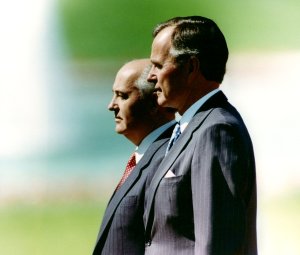Howard Dicus: George Bush's election victory was also a victory for Ronald Reagan. As recently as July when Micheal Dukakis led in the polls, some analysts said the Reagan revolution was over, that Reagan policies could not hold the voter support without Mr. Reagan on the ticket, but they did. Ronald Reagan shared the triumph with his vice president. Earlier in 88 another triumph, Ron Amadon reports the President shared that one with his chief international adversary.
Ron Amadon: March 3rd 1983, President Ronald Reagan expressing his beliefs about the Soviet Union.
Ronald Reagan: “They are the focus of evil in the modern world.”
Ron Amadon: The so called evil empire speech that marked the early hard line of the President toward the Soviet Union, but times change and the Soviet leaders change too. So much so that on march 23rd 1988, almost five years exactly from the evil empire speech, Ronald Reagan emerged from the White House with Soviet Foreign Minister Eduard Shevardnadze to announce --
Ronald Reagan: “The Moscow Summit.”
Ron Amadon: Earlier on who would have believed that Ronald Reagan would one day be greeted on the tarmac of Moscow airport and inside the walls of this historic building --
Unknown Speaker: “I welcome you in the Moscow primer.”
Ron Amadon: The President went to Moscow to exchange documents, to ratify the INF missile treaty, the first one between the super powers to eliminate an entire class of missiles.
Ronald Reagan: “The first step toward a brighter future, a safer world.”
Ron Amadon: The INF accord only eliminated 2000 missiles, a pittance among the super power arsenals, but a milestone nonetheless. Amid talk that the US and the Soviets might go further toward elimination of 50% of the city destroying long range nuclear missiles. The Russians were optimistic.
Unknown Speaker: “I think that the treaty is possible”
Ron Amadon: In the end this turned out to be a higher hurdle than Reagan or Gorbachev could clear. This huge roadblocks did not stop the President from pushing ahead even further on the road to greater human freedom inside the Soviet Union.
Ronald Reagan: “So I say with Pushkin, it's time, my friend it's time.”
Ron Amadon: The two leaders met, argued, disagreed and parted. Well, not quite friends, the administration was quick to point out, but closer perhaps than any US President and Soviet leader have been for years. I am Ron Amadon.
Howard Dicus: Mikhail Gorbachev proved in 1988 that he had come a long way since becoming the leader of the Soviet Union years before. This was the year he consolidated his power. It was Soviet President as well as party chairman Gorbachev who addressed the UN and announced the USSR would do something it had never done before, unilaterally cut the size of the Red Army.
Mikhail Gorbachev: “We are witnessing the emergence of a new historic reality, a turning away from the principle of super armament to the principle of reasonable defense sufficiency.”
Howard Dicus: The head of the red army resigned for health reasons the same week. Soldiers were sent to Soviet Armenia in 1988. They went to arrest nationalist demonstrators and instead wound up as rescue workers when Armenia was hit by a devastating earthquake. Whole towns collapsed, tens of thousands of people died. This Soviet official spoke for everyone.
Unknown Speaker: “In this Soviet family of nations, the pain for our Armenian brothers and sisters has become the pain of each and everyone of us.”











